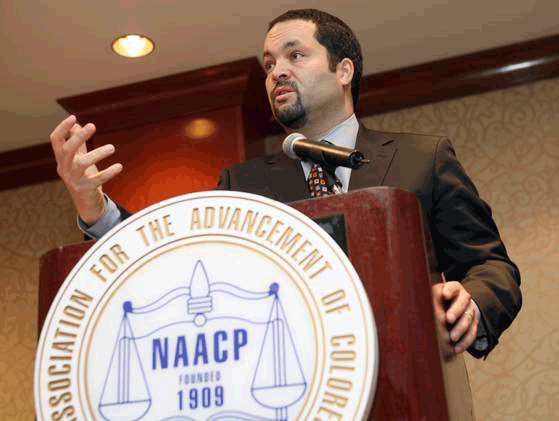
National Significance Attributed to Puffin/Nation Award for Ben Jealous of NAACP
December 12, 2012
When Benjamin Todd Jealous stepped on stage last week to receive one of the ideological left’s most prestigious awards, he was greeted with thunderous applause from the assembled audience, a collection of this nation’s most unrepentant liberals.
NAACP President and CEO Benjamin Todd Jealous
(Photo: Diane Bondareff, AP) via USA Today
Jealous came to the Nation Institute’s annual gala to be honored with a $100,000 prize “for his unwavering dedication to civil and human rights.” When Jealous arrived, he found himself in the midst of a fawning crowd of liberal icons that included former TV talk show host Phil Donahue, Nation magazine publisher Katrina Vanden Heuvel, Sen. Bernie Sanders, I-Vt., and Perry and Gladys Rosenstein, whose Puffin Foundation has championed more liberal causes than Al Sharpton.
But these people and the others who filled the small ballroom in New York City’s Flatiron district this night were there as much to celebrate the resurrection of liberalism as to toast Jealous. The youngest person ever to lead the NAACP, this nation’s oldest and largest civil rights organization, Jealous was touted for his support of same-sex marriage, opposition to the death penalty and work to defeat voter suppression legislation.
As the recipient of the 2012 Puffin/Nation Prize for Creative Citizenship, he was — for this group, at least — the most obvious manifestation of a liberal resurgence. While recent polls show that conservatives significantly outnumber liberals, liberal ideals and causes have not had a better year since Lyndon Johnson signed the 1965 Voting Rights Act into law.
Proof of this can be found in the approval last month of same-sex marriage laws in Maryland, Maine and Washington, the first states to legalize gay unions by popular vote. And it was evident in the success Democrats had at the polls this year. Liberals revel in the re-election victory President Obama, a moderate Democrat, achieved over Mitt Romney, the GOP candidate whose campaign was a genuflection to the demands of this nation’s most misguided conservatives.
Evidence of the banner year for liberals also can be seen in the gains Democrats made in the U.S. Senate, which pushed their majority to 55 seats (including two Independents who are expected to join their caucus). These victories came in a year in which political pundits widely believed Republicans would seize control of the Senate. Among the right-wing Republican Senate candidates who went down to defeat were Tea Party favorites Todd Akin of Missouri and Richard Mourdock of Indiana. Both suffered fatal self-inflicted political wounds.
Akin, the House Republican who tried to unseat Democratic Sen. Claire McCaskill, offered up this troglodyte reason why a woman who is raped should not be allowed to have an abortion: “If it’s a legitimate rape, the female body has ways to try to shut that whole thing down,” he said. Mourdock, the state treasurer, did the same and turned what appeared to be a sure victory into defeat when he said in defense of his opposition to abortion that pregnancies resulting from rape are something “God intended to happen.”
While both McCaskill and Joe Donnelly, the House Democrat who won the Indiana Senate seat, are moderates, their victories staved off right-wing candidates and gave liberals good cause for jubilation.
Liberals also chalked up victories in Washington and Colorado when voters in three states that considered measures to legalize the recreational use of marijuana gave their approval. Only in Oregon was this proposition defeated.
Long a member of the coalition that makes up the Democratic Party that for years was in retreat, liberals are now part of a political alliance that increasingly finds itself in the winner’s circle when voters go to the polls — a resurgence that understandably makes them want to celebrate.
DeWayne Wickham writes on Tuesdays for USA TODAY
